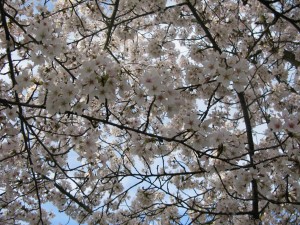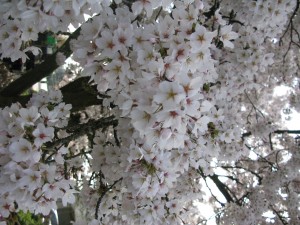 As I head up the street, I still expect to see Professor Bonhorst leaning against his garden hoe, contemplating his front yard. At this time of Spring, it would be the daphne blooming, the forsythia, not to mention the daffy’s, grape hyacinth and magnolias in full bloom and the tulips just about to burst open. Spring bounty and the fresh new green of the unfurling leaves. With a soundtrack of sparrows, warblers, finches, swallows, wrens, robins, grosbeaks and chickadees positively giddy with the season.
As I head up the street, I still expect to see Professor Bonhorst leaning against his garden hoe, contemplating his front yard. At this time of Spring, it would be the daphne blooming, the forsythia, not to mention the daffy’s, grape hyacinth and magnolias in full bloom and the tulips just about to burst open. Spring bounty and the fresh new green of the unfurling leaves. With a soundtrack of sparrows, warblers, finches, swallows, wrens, robins, grosbeaks and chickadees positively giddy with the season.
It was at such a time of season that I first met the Professor. I commented on how lovely the cherry blossoms were on the tree in his front yard. I probably said something like, “Well, Spring has sprung, finally”. I remember him looking me square in the eyes and, with a hint of humor, wizened by time earned wisdom, quoting in Latin: “Cedit item retro, de terra quod fuit ante, in terras. What once sprung from the earth sinks back into the earth”. A quote from Lucretius, he said; from his first century BC manuscript De Rerum Natura, “On The Nature Of Things”.
“As you can see,” the Professor said, pointing at the cherry tree. It was leaning heavily to one side and, if not for the 2 by 4 with cross piece that he had used to prop it up, it would surely topple, pulling its roots from the ground terminally. And yet, it is ablaze with white blossoms. “I do what I can to keep it alive. My wife and I planted it when we first acquired this home, when we ourselves were young. Now I am not doing much better than the tree”. He says this all with a gleam in his eye, as if he’s confiding a joke we both should share. I nod and say something inane like “Have a good day”. And got back to the task of delivering the mail, heading down the street, leaving him to survey the garden before him.
Subsequently, each time we met, he would impart a line from Lucretius in answer to my greeting. Perhaps it was a scholarly barter for his mail, or an entreaty for a much longer conversation into the nature of things. Such as:
When he quoted: “Thus the sum of things is ever being renewed, and mortals live dependent one upon another. Some nations increase, others diminish, and in a short space the generations of living creatures are changed and like runners pass on the torch of life”, I learned that he had been a Professor Of Chemistry at the University Of Portland.
When he quoted: “The first beginnings of things cannot be distinguished by the eye”, he told me that Lucretius was a philosopher poet extolling the beliefs of Epicureanism. That he translated the book because of his fascination that a basic tenant of modern physics, that of atomic theory, was being grappled with at so early a stage of man’s development. This philosophy from Epicurus had, at its core, that “pleasure” was the goal, attained by living modestly, seeking knowledge of the workings of the world and by limiting one’s desires. In this way one can attain a state of tranquility. More importantly to modern science it proposed the belief of all matter consisting of atoms. A far cry from previously held cause and effect notions, such as, if a log is combustible then it must have “fire” as its essence. It described a universe as being guided by “chance” (fortuna) rather than any divine intervention of Roman Gods and deities so commonly believed in at the time. Which is probably why the manuscript went missing until 1417; no doubt purged by church and state combined. It, nevertheless, was located in a monastery, where upon its influence became a tidal wave through the Renaissance and upended the sciences.
“So far as it goes, a small thing may give analogy of great things, and show the tracks of knowledge”. And, as far as I could see, the Professor’s garden, tilled, weeded, and nurtured, had become his microcosm of the world. As he noted the phenomena before his gaze: photosynthesis, the molecular dance of the elements, the flow and ebb, expansion and constriction of terra firma, the dispersion of light.
Often, though, the Professor’s quotes began to refer to the mortality of man, and, more and more, he talked of his slowing down, his creaky bones, his acceptance of a limited time remaining on this earth. He smiled at the foolishness of most folk scurrying about with life’s busi-ness; ultimately amounting to nothing in the end.
* “To none is life given in freehold; to all on lease”.
* “By protracting life, we do not deduct one jot from the duration of death”
* “Therefore death is nothing to us, it matters not one jot, since the nature of the mind is understood to be mortal”
When he quoted: “But if one should guide his life by true principles, man’s greatest wealth is to live on a little with contented mind; for a little is never lacking”, it was certain to me that the Professor was content to be a contemplative man; tending his garden, translating Lucretius, and considering the nature of things. I found out later from his neighbor that some evenings he gave cello lessons to university students on his patio. And, sitting on her back deck, the sonorous sounds of Bach was quite pleasant as she sipped a glass of wine.
He was delighted that I had attended the Great Books Program at St Johns College and that we had studied, in a basic manner, the art of translation from Ancient Greek to English. That the art of translation was as mercurial and elusive as life itself. So much like traveling from one country to another, each with their different mores and customs, and building a bridge between them. He pointed out that Lucretius‘ verse: “In the midst of the fountain of wit there arises something bitter, which stings in the very flowers.” could just as easily be read as “ From the midst of the fountain of delights rises something bitter that chokes them all amongst the flowers”. He found it an enjoyable pastime to ponder such things. As important as asking: “How many angels dance on the head of a pin” or “How does your garden grow”.
I think he missed his life as an educator, a gardener of maturing minds. That Socratic technique of answering a student’s question with another question, opening them to a wider view and possibilities they didn’t yet know existed. Guiding them to a path of inquiry that may prove fruitful. I think he relished the passion of inquiring minds. That, in the end, there is always so much more to learn; that the phenomena is more vast than we can fathom in one lifetime. That every strongly held belief leads to more questions than any easy answers. That the “query” is the only destination for a contemplative mind.
We would sit on his stoop occasionally, after my work day was done, and talk more at length (rather than the short burst of discourse as I handed him his mail). The shadows cast by the fourth dimension on Plato’s cave wall. Pythagorean theorems worked out on chalk boards in my freshman year at St John’s, primordial gravitational wave pull, companion gardening and, even, just what’s for dinner ! Over time, however, I could see he was moving more slowly, apt to nod and smile and talk less. We would sit silently and observe the garden as it grew.
Eventually, due to failing health, he and his wife, Harriet, needed to move to Sacramento to live by their daughter. A neighbor was given the task of cleaning out the house and preparing it to be sold. As they had taken little with them when they moved, a considerable amount of accumulated belongings needed to be dispersed or tossed. So many charity organizations now cannot afford, or are unwilling to pick up and sift thru donations. It was sad for me and for neighbors to see so much of their belongings tossed into three of the largest sized dumpsters I had ever seen. Wheel barrow after wheel barrow, box after box. I still hear the “ker-splish” of loads hitting the dumpster floors, as I walked by, delivering the mail. Remembering this reminds me that I have to make a “Living Will” so that the music and books and art that I have will go to good homes.
The neighbor who organized the cleanup in preparation for selling the house contacted me, knowing that I had been a chef, wanting me to go thru the cookbooks of Mrs Bonhorst, as she had once taught home economics at the university. I am delighted that I have some of her books on my shelves and was glad that the neighbor had set them aside for me. Unfortunately, by the time I got there, after work, nothing else remained.
The one book I would have treasured the most was Professor Bonhorst’s copy of Lucretius’ On The Nature Of Things. No doubt well worn and underlined. Nevertheless, to this day, as I walk by his house, with the cherry tree now gone, and nothing remaining of his garden, I still see him standing there, leaning against his garden hoe and hear him talking of Lucretius and many other things. And that gleam of humor in his eyes.
Along with my chats about history with Pastor Al, and my talks with Don Dinsmore, Curator of the University Of Portland’s Museum collection, both also deceased, I consider the memories of my meetings with each of these three men, although perhaps ordinary for some, to be, nevertheless, remarkable, indeed. I see them still.



